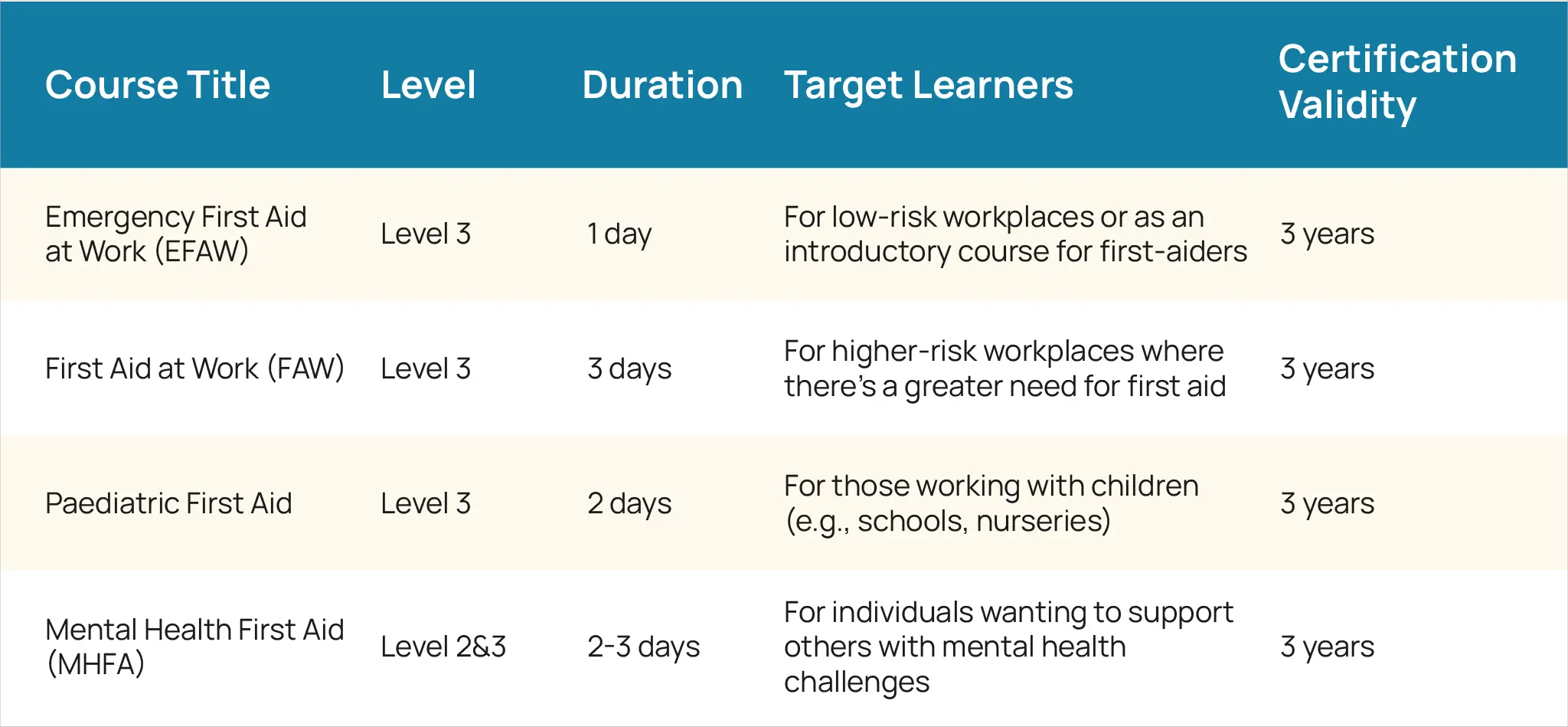First aid training teaches employers and employees the skills to handle emergencies professionally. Selecting the right course depends on understanding your organisation’s specific needs, including the type of work, the level of risk (high or low), the number of employees, and the workplace size.
How many First Aiders are Required for a Workplace
The Health and Safety Executive (HSE) provides the following recommendations:
Low-risk workplaces (e.g., offices) with 25 to 50 employees: At least one person should be trained in Emergency First Aid at Work (EFAW).
Low-risk workplaces with more than 50 employees: One person trained in First Aid at Work (FAW) is required for every 100 staff members.
High-risk workplaces (e.g., construction sites or factories): Due to the increased likelihood of serious incidents, additional training and a greater number of first aiders are required.
Providing first aid training is not only a legal obligation for employers in the UK but also an ethical one. Having trained staff can save lives, reduce workplace injuries, and create a safer working environment
Who is a First-Aider?
A first aider is trained to help sick or injured people until professional medical help arrives. In emergencies, first aiders are often the first to respond, ensuring the safety and calmness of those involved until further help arrives. Anyone can become a first aider by learning these skills, making it a valuable way to contribute to the safety of their workplace or community.
What are the Levels of First-Aid Training
Qualified first aiders undergo one of two main types of training; FAW and EFAW training. EFAW stand for Emergency First Aid at Work course and is for lower-risk workplaces like offices or retail shops.
This one-day training covers basic CPR, managing bleeding and wounds, treating minor injuries, and handling choking incidents or other emergencies. Upon completion, participants receive a certificate valid for three years.
The First Aid at Work qualification, or FAW course, is more detailed for higher-risk workplaces. This three-day training includes everything in EFAW, along with additional topics such as managing seizures, heart attacks, diabetic emergencies, and severe allergic reactions. FAW certification is also valid for three years.
Health and safety regulations may not require a trained first aider in smaller businesses. Instead, a responsible person can be appointed to oversee first aid. While formal training isn’t compulsory for these roles, many take a Basic First Aid course to handle minor emergencies confidently. First aiders, regardless of their training level, play an important role in ensuring safety and providing immediate care during emergencies.

Ready to Learn More?
Check which course is right for you by visiting Our First Aid courses offer complete training to help you handle critical situations. Whether you want to improve your skills or workplace safety, these courses help build confidence and expertise. View our Emergency First Aid at Work (EFAW) and Level 3 First Aid at Work courses. These courses meet the UK legal requirements and help you keep people safe.
What is the Difference between EFAW and FAW
Emergency First Aid at Work (EFAW) and First Aid at Work (FAW) are two levels of first aid training courses required for workplaces in the UK. Both courses provide employees with the skills and knowledge to handle workplace injuries and medical emergencies. However, there are key differences in the content and requirements of each course.
Feature | EFAW (Emergency First Aid at Work) | FAW (First Aid at Work) |
Duration | 1 day | 3 days |
Suitability | Low-risk workplaces with 25-50 workers | High-risk workplaces or larger businesses with >50 workers |
Topics Covered | CPR, wound care, managing unconscious casualties, choking, bleeding, and shock | All EFAW topics plus fractures, burns, medical conditions, and advanced first aid |
Level of Training | Low-level basic first-aid training | High-level advanced first-aid training |
Certification | Emergency First Aider certification | First Aider certification |
What Qualifications Does a First Aider Need in Schools
In schools, first aid requirements are specific to the unique needs of children. Schools and early years providers must ensure that staff are trained in first aid, and at least one person must hold a current Paediatric First Aid (PFA) certificate. This qualified individual must be present whenever children are on the premises or participating in school trips.
This requirement ensures that schools are prepared to handle emergencies specific to children, such as choking or playground injuries.
How Long Does a First Aid Course Last
First-aiders should complete refresher training every three years to maintain their certification and skills. Regular refresher courses are important for several reasons:
Maintaining Skills: First aid techniques can be forgotten over time. Refresher courses help first-aiders stay confident and effective in emergencies.
Staying Updated: First aid guidelines and legal requirements can change. Refresher training ensures first aiders are up-to-date with the latest procedures and standards.
By keeping training current, first-aiders can continue to perform their roles and meet legal requirements.
Who should take up the Mental Health First Aid Course
Mental Health First Aid (MHFA) is a level 2 first aid course for anyone who wants to learn how to help people struggling with mental health issues. It’s useful for those who work with others or in environments where mental health challenges might arise.
Mental Health First Aid is useful for managers, HR professionals, teachers, healthcare workers, community leaders, and anyone interested in mental health. It helps people recognise mental health problems and provides the right support until professional help can be reached.


Check which course is right for you by visiting our First Aid courses that offer complete training to help you handle critical situations. Whether you want to improve your skills or workplace safety, these courses help build confidence and expertise. View our Emergency First Aid at Work (EFAW) and Level 3 First Aid at Work courses. These courses meet the UK legal requirements and help you keep people safe.

